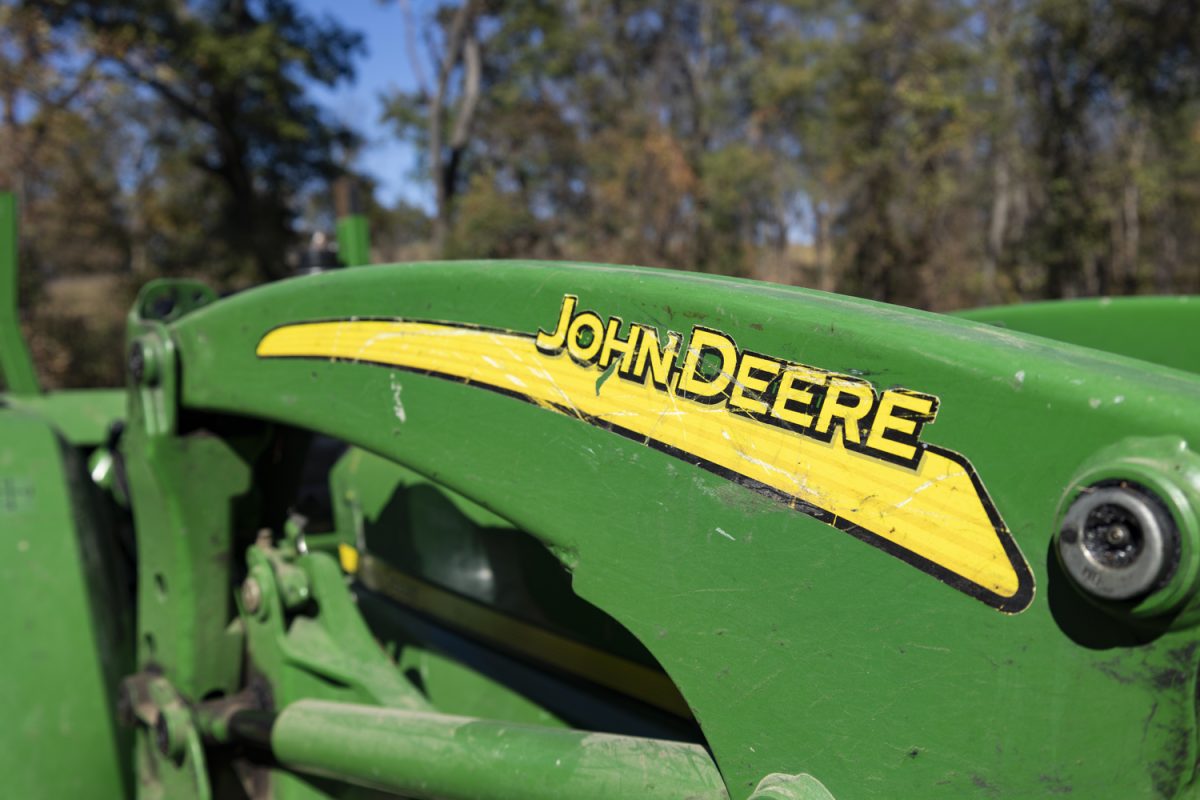There is a specific pattern in the Midwest farming industry, and Iowa is no exception. Iowa is the second largest agricultural exporter in the U.S. according to the Iowa Farm Bureau, which also describes agriculture as vital to the state’s economy.
The pattern lies in the fact that this continuous and enduring industry — evidenced by the fact that 85 percent of Iowa’s land is farmed according to Living History Farms, — has a tendency toward fluctuation and, in the recent planting and harvest seasons, has been trending downward.
Deere and Company, commonly known as John Deere, is an American agriculture, forestry, and other heavy machinery manufacturing corporation. Various layoffs have occurred in at least three different John Deere manufacturing plants in eastern Iowa over the past few months, according to the Iowa Worker Adjustment and Retraining Notification Act notification system. In fact, these plants, located in Dubuque, Davenport, and Waterloo, are expecting more layoffs soon.
However, despite the previously stated cyclical nature of agriculture, people who are geographically connected to the industry and its other markets are not always as elastic.
In October, the John Deere plant in the Quad Cities laid off an additional 287 employees. This comes after the Waterloo and Dubuque plants also laid off hundreds of workers earlier this year. Some of these employees are not just manufacturing workers but salaried, white-collar employees working in administrative and office positions.
In an email to The Daily Iowan, John Deere Public Relations Director Ken Golden wrote the reason for the layoffs is two-pronged. He wrote the weakening farm economy is responsible for the company choosing to look at layoffs as a current solution. Additionally, John Deere has seen a decrease in customer orders for their equipment, he wrote.
He wrote that the U.S. Department of Agriculture is expecting five percent lower crop receipts. Commodity prices also continue to drop significantly by over 30 percent.
This trend is not limited to John Deere. Multiple other agricultural manufacturers are facing hardships. According to Farm Progress, numerous other manufacturers have resorted to layoffs as a result of downtrends in the market at the hand of continued inflationary pressures combined with lower market performances typical in the cyclical model.
Johnson County farmer Jim Thompson, who uses John Deere equipment, said commodity prices, income, and business expansion are all interrelated. This is true for any business, but considering this model’s longer lifespan of the inputs involved in agriculture, the picture of several-year-long trends becomes clearer.
Thompson said Johnson County farmers, among others in the Midwest, are seeing a record crop during this year’s harvest. A fact of economics is an increased influx in supply ultimately causes a lower price per unit, a truth of markets that has inexorably been realized.
This reduction in commodity prices has resulted in generally lower income, Thompson said, which means upgrades to existing machinery and new machinery purchases are not on the minds of many farmers, including himself.
Agriculture inputs are somewhat limited. Farmers first need land, which is a long-term asset with little necessary maintenance beyond things like drainage tile. Farmers need buildings to store equipment, and they need seeds to plant. Farmers especially need equipment manufactured at the John Deere plants, which costs millions of dollars. However, once that equipment is purchased and faces occasional maintenance, most farmers use that equipment for a long lifespan.
Beyond typical factors like labor and capital, farmers conceptually need little else. The lengthy lifespan of most of these inputs contributes to the rise and fall in the farm economy. Thompson said higher income in previous years led to any necessary equipment purchases or repairs being done then as opposed
to now.
“It’s kind of a cycle, for the most part, where there’s not as many dollars there to be putting back into equipment,” he said. “It’s not a John Deere issue, in my opinion. Farmers across the board are not spending as much money right now.”
RELATED: New agritourism coalition promotes business through bus rides around Johnson County
So, with the equipment largely paid for and maintained, it is clear to see why farmers are demanding less equipment from manufacturers.
AGCO announced layoffs earlier this month and anticipates a 10 percent reduction in its production. In August, Alamo Group, an ag manufacturer based in Seguin, Texas, announced layoffs at its Gibson City, Illinois, facility.
Farm Management Specialist Ryan Drollette at the Iowa State University Extension Office in Johnson County said many manufacturers have laid off workers. He said Kinze Manufacturing in Williamsburg laid off 25 percent of its workforce this summer.
Drollette said Johnson County farmers especially have seen a larger crop than in previous years because of increased precipitation. He describes the supply and price relation economics as prices reacting to inflated supply and ultimately creating conditions that leave machinery manufacturers vulnerable.
“What you get is a chain reaction effect,” he said. “You have independently owned equipment dealers, and they have to worry about how much they need to make and how much they’ll sell. Some manufacturers need to auction machinery off just to get it off the land.”
Drollette said agriculture manufacturing and production is a global export market, and demand in the rest of the world for manufacturing services affects people as local as farmers in Johnson County who contribute to the agriculture industry.



